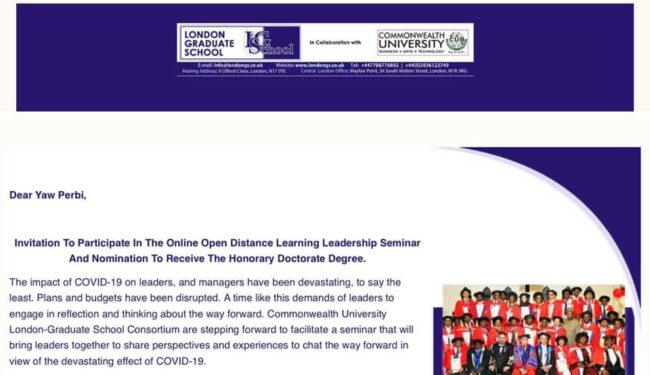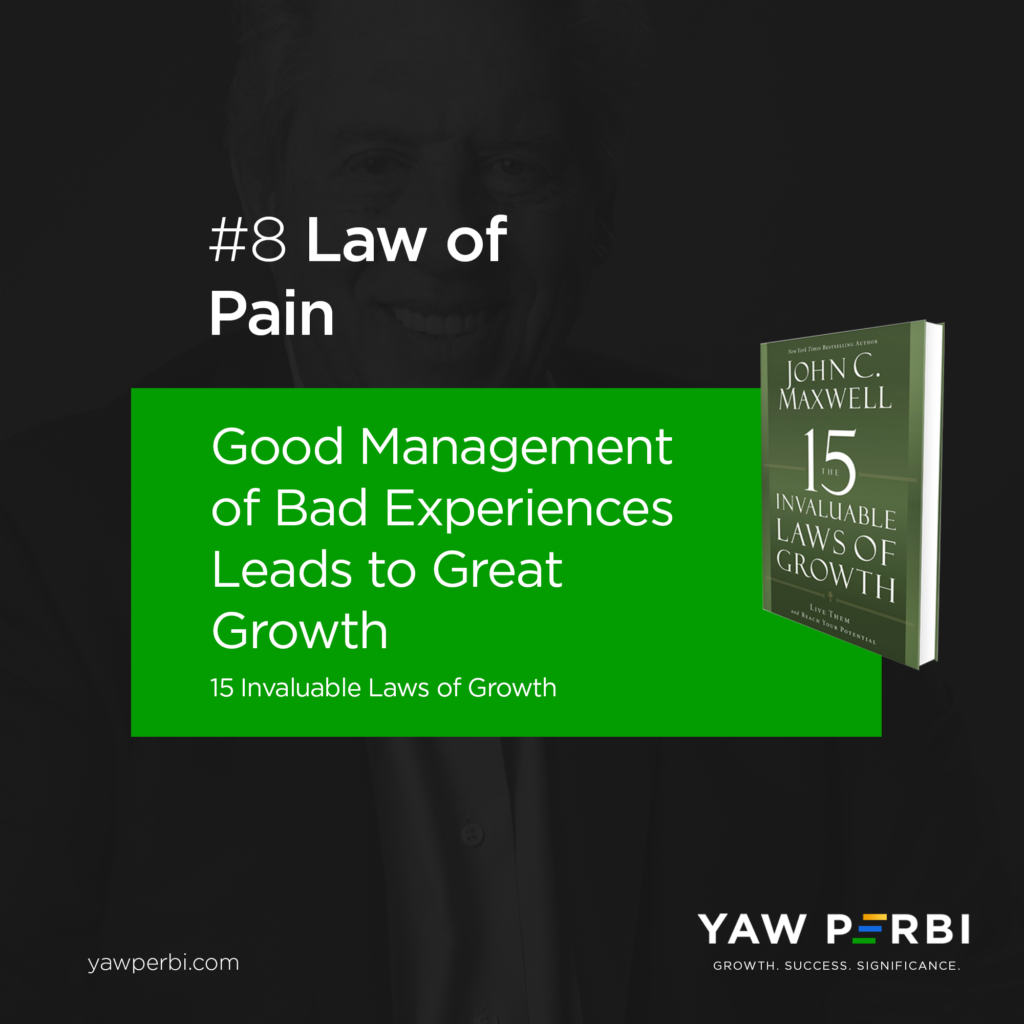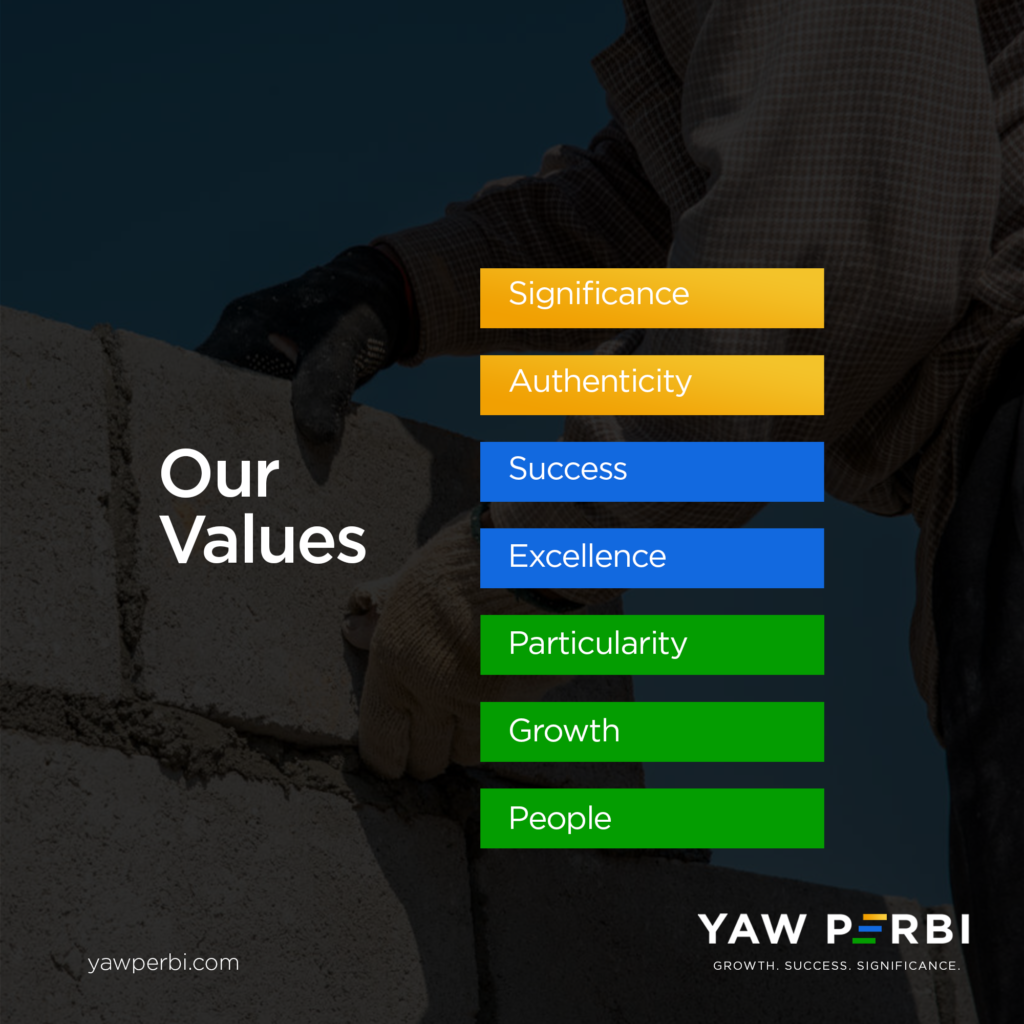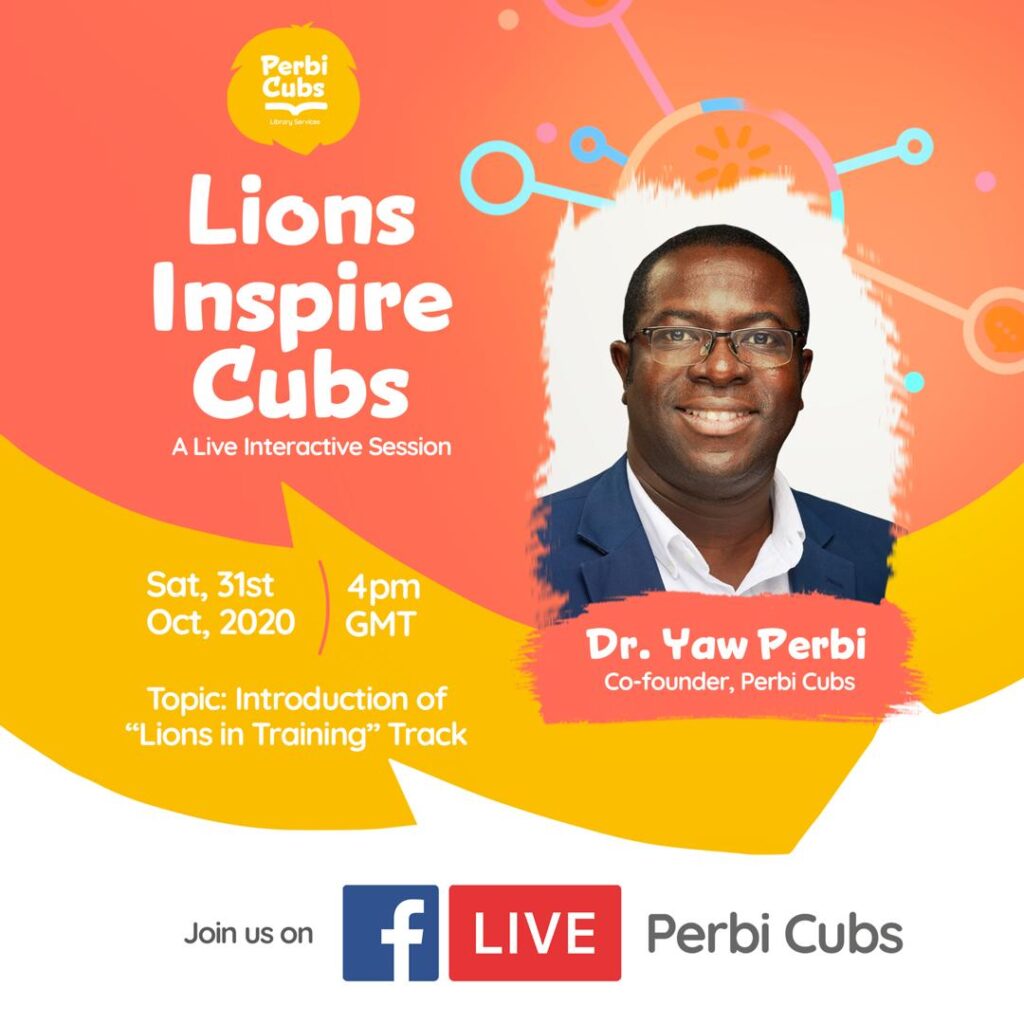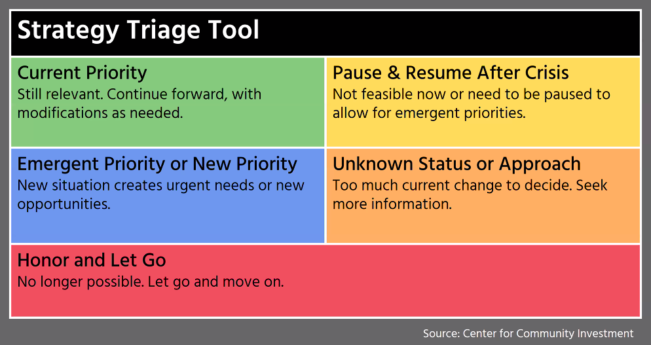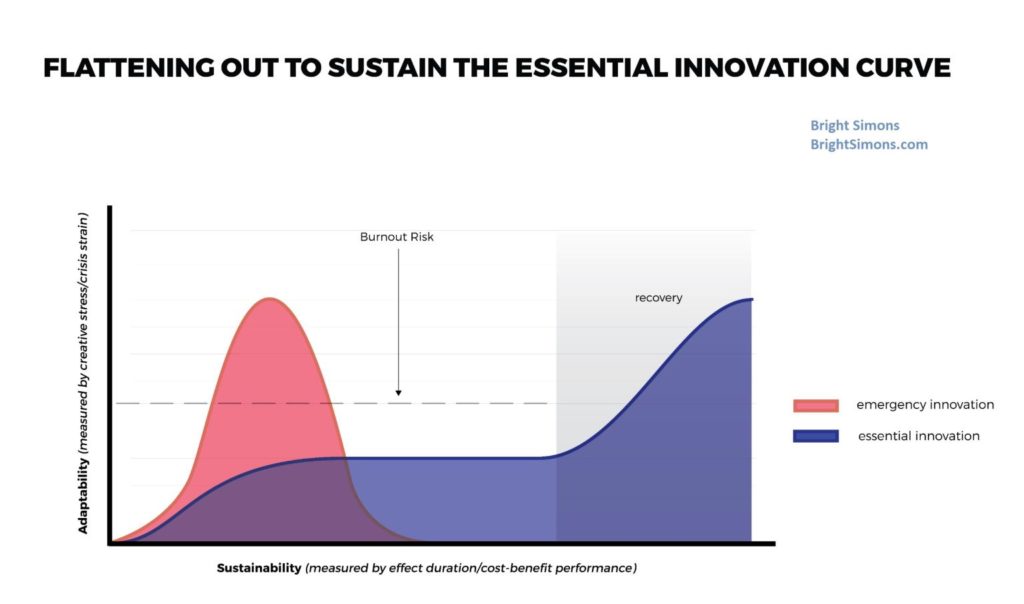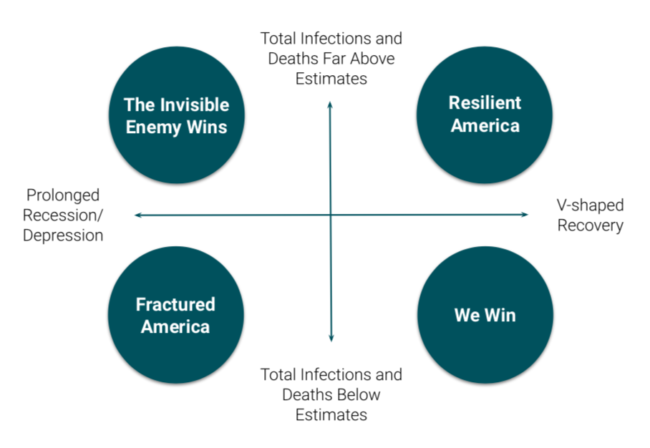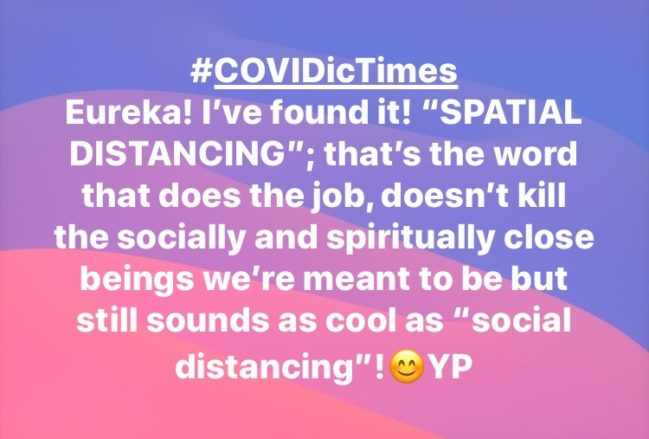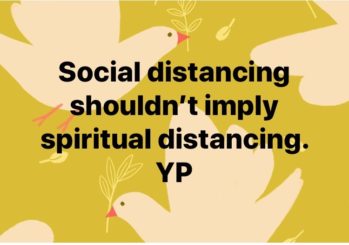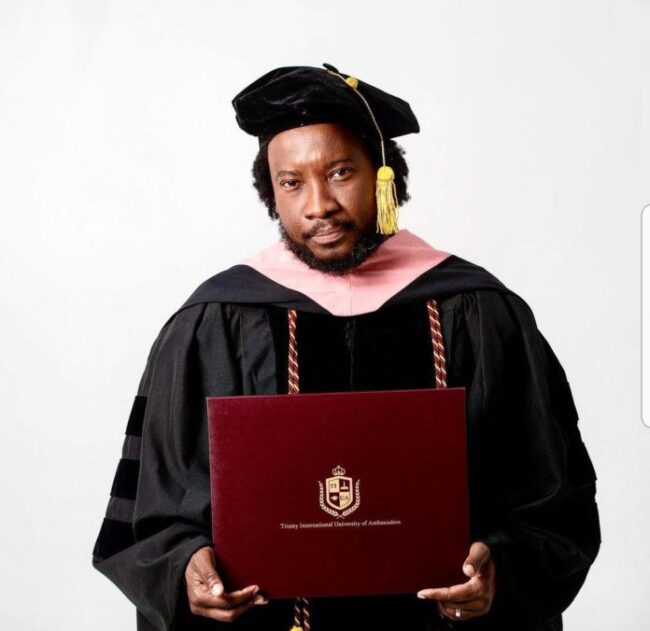
Nothing to Prove, Nothing to Hide, Nothing to Lose
Recently I received an email (partly screenshot above) announcing my nomination to receive an honorary doctorate degree. It is is possible that I would have felt more flattered and been more tempted to go after this fake degree from these fictitious institutions had I not already been a “Dr.” (medical). Coming from a family in which my grandfather was an emeritus professor and where my mother and father-in-law are PhDs in history and economics respectively, these titles don’t exactly faze us. Yet those who offer them know they are toying with very powerful human emotions, motivations and identity issues at the core of our being and have made a good business of it. As my best friend said when I forwarded the said email to him, “this has nothing to do with you; it has everything to do with business.”
Some however, including many Christian leaders, have taken the bait and gotten decorated with very dubious degrees and titles. Recently, there was a huge brouhaha over a popular Ghanaian musician based in London who was alleged to have amassed three degrees, including a PhD, within four months! Perhaps if he had even shut up, none of this would’ve become an issue of investigation and castigation setting social media abuzz but he was flaunting it and ‘praising God’ for the fake feat. The desire to flaunt it itself reveals the very identity and emotional challenges he might have that perhaps led to him to go for those inauthentic accolades in the first place.

Popular gospel singer, Sonnie Badu, has now supposedly earned the title ‘Dr’ after bagging a doctorate in Musicology and being awarded two more degrees.
The above picture of Sonnie, whose giftedness is unquestionable but his academic credentials are, was uploaded by himself on social media touting his feat. I have met Sonnie. He is a fine young man and anointed. But I can also tell you he is far from perfect; just like you and me. Speaking of Sonnie and musicology, incidentally, my grandfather was a celebrated ethnomusicologist. His work earned him many accolades including several honorary doctorates but he never used the title “Dr.” because although he had done enough original research work to deserve ten doctorates he never really formally pursued a PhD per se. Interestingly, he shot straight from ‘mister’ to ‘professor’ and was ’emeritus professor’ for the last three decades or so of his life.
This degree brouhaha touches on at least three issues: identity, purpose and authenticity.
IDENTITY
There was once a programme organized by a friend of mine. The MC got on stage and introduced a certain pastor to come up and offer a prayer. He inadvertently introduced him, with no malice, as Mr. XYZ. XYZ comes up, grabs the mic and makes a correction, “I’m not Mister, I’m Pastor.” That wasn’t all; it gets worse. Later he clears his throat and amends his correction saying something like, “In fact, I’m not Pastor, I am Reverend.” Ahem. Wow! What a shock, what a shame.
But lest I come across as holier than thou, remember I told you that the people offering fake degrees know exactly what they are massaging in us: the ego. I can tell you that as a medical doctor myself there are many times when people address me in speech or in writing as ‘Mr.’ and I have a natural gut reaction to get offended, said in my head something like “do you know who you’re talking to?” and yearned to correct them. There’s a part of me that even justifies it thus: “mehn, but you earned it.” That, my friend, is not the authentic self.
We need not, and indeed should not, root our identity in external things like what we wear, how much we earn, what degrees or title(s) we have acquired. Anything that man can give you, man can take away. Let’s not root our identity in any such thing. And you would think that supposed men and women of God would know better and root their identity in nothing less than Christ himself.
PURPOSE
You may have ‘more degrees than a thermometer’ and still not accomplish your God-given purpose. There are some without degrees at all and yet have made much more impact in the world than those with many letters behind their names. Your purpose in life determines the vehicles and tools you need to use. It’s strange to make the acquisition of vehicles and tools our primary objective when one hasn’t first sat down to evaluate if that is what they need to get done the job they came on earth to accomplish. It’s about dreams, not diplomas and degrees.
Did you read about the recent brouhaha over the apparent insistence of Jill Biden, wife of the current U.S. president, to be called “Dr” ? It’s really been going on for at least a decade now: “Hi, I’m Jill. Jill Biden. But please, call me Dr. Biden.” The December 2020 op-ed by Joseph Epstein in the Wall Street Journal implored Jill Biden to “think about dropping the honorific, which feels fraudulent, even comic.” Personally, I think the essence of what Epstein was trying to say became lost in what became an embroilment in sexism. The real question should be: does being ‘Dr.’ make Jill a better educator (that she’s been for decades) or not? Everything else is secondary; even tertiary.
AUTHENTICITY
This degree saga leaves a lot to be desired when it comes to authentic leadership. It speaks to the core of authenticity. Authentic leaders have:
- nothing to prove–a matter of humility (not try to project self worth)
- nothing to hide–a question of integrity (no playing of games but totally transparent)
- nothing to lose–a matter of simplicity (not strive for social image or popularity).
As you might have noticed, humility, integrity and simplicity as an acronym spell HIS. This is particularly instructive to Christian leaders. Those of us at the Third Lausanne Congress on world Evangelization in Cape Town in 2010 were passionately exhorted by theologian Chris Wright to be God’s saints, Christ’s people, HIS people of humility, integrity and simplicity.
NOT SO WITH YOU
Again, especially for Christian leaders, the primary power base of an authentic (wo)man of God is spiritual power—not positional or personal power. Others may go that route but Jesus was very clear to his followers who would be leaders: “not so with you.” In May 2020, I wrote quite extensively on that here. We need to lead different. This issue just won’t go away until Christians really chose to be H.I.S. people.
CONCLUSION
In light of the recent brouhaha about fake degrees, Friends, BE WARNED. Don’t allow your ego to be stroked and stoked, making your false self acquiesce to receiving fake degrees from fictitious institutions. If you want a degree, go to school and study for one! In any case, one doesn’t necessarily need a degree to succeed in life! Hopefully your going for a diploma or degree would only be because you have observed It will a good vehicle or tool towards your dream. Again, the thing is: You can have ‘more degrees than a thermometer’ and still not fulfill your God-given purpose in life.
I have a mentor who likes to say, “the thing about titles is that if you’re good you don’t need them; if you’re not they won’t help you.” Heaven help us!

Family Planning Isn’t What You Think
There has been such an overwhelming response (over 80,000 reached!) to a social media post I made regarding a misconception about the essence of family planning that I felt it might be useful to document that write-up on this blog.
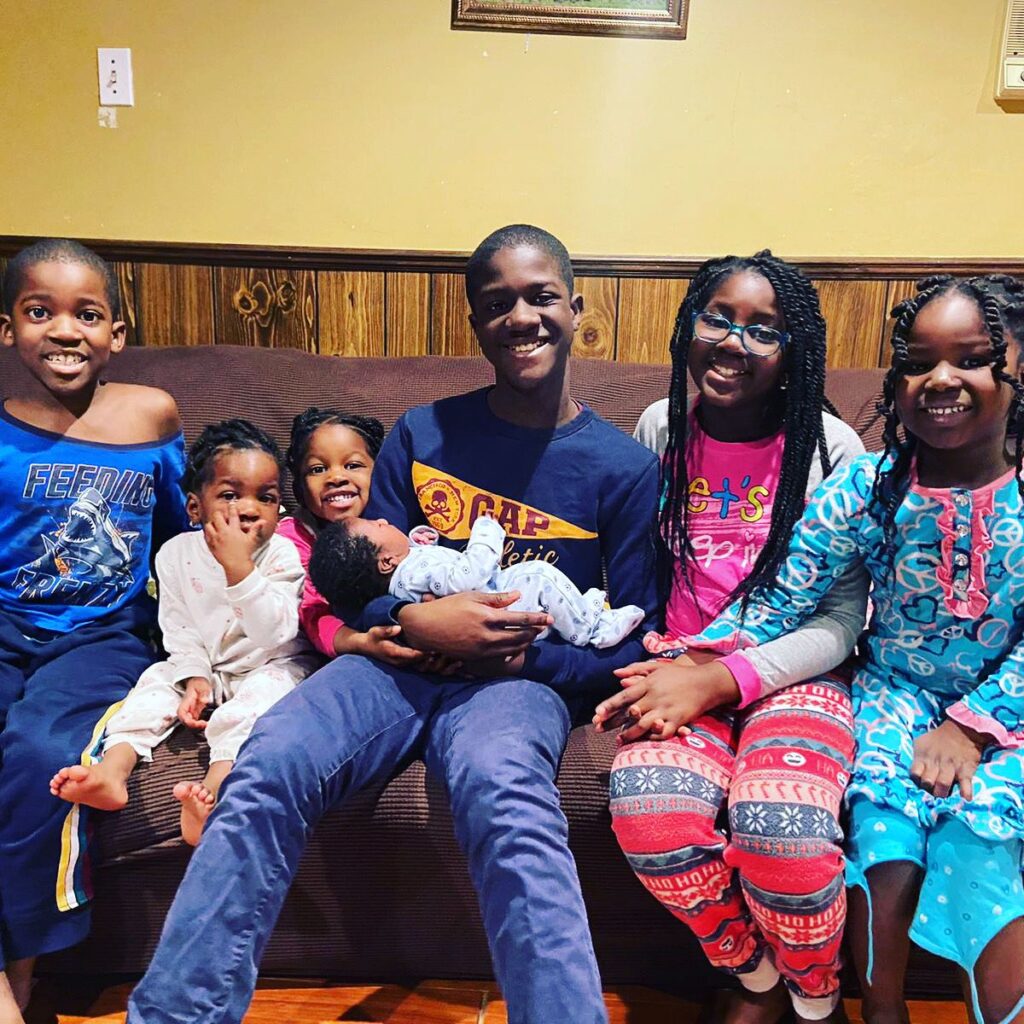
Our six older children totally excited about the arrival of the seventh the day we got back from the hospital after delivery.
On Tuesday, March 2nd our seventh child was born. The rather long boy descended down his mother’s birth canal at the Montreal Jewish Hospital in all his 3.895kg glory. The posting of this momentous occasion on social media sparked a flurry of responses, almost 100% affirmative but I won’t be fooled. Not everyone thinks my wife and I are smart, planet-friendly, trendy, progressive, modern and such.
Just a couple of weeks earlier I had been on a Zoom call with a just-married pastor in Ontario who hopes to have a family of three children. Upon hearing that Anyele and I were expecting again, our seventh child for that matter, he unwittingly asked, “why so many?” To which I responded, “why so few?” The blushing of his face and awkward laughter revealed his embarrassment.
I have mentioned before how people have made it very clear to Anyele and I that they would rather raise pets than have children. Generally our human selfishness/self-centredness doesn’t allow us to do the parenting thing (at all or well) because children are an inconvenience, suckers, an unwelcome reflection of our marred selves, among a host of other postmodern reasons. See here.
“WHY SO MANY?”
We have met people who are proud DINKS–Double Income No Kids. In many circles we’ve been in, this has been the ‘in thing’ or at best two is the most ‘decent’, ‘smart’ and even ‘cute’ thing to do. As I heard one preacher humorously quip, “a boy for me and a girl for you, and praise the Lord we’re finally through!” A year ago, I shared here some of the reasons why Anyele and I have chosen to have “so many.”
Having children or not, many or few at the end of the day is more of a worldview issue than a socio-economic or even climatic one. I share our Christian theist view in this blog. In summary, “There is a higher Being than our selfish selves that beckons; a higher purpose than the painful inconvenience that compels; and a deeper fulfilment of something (and someone) that outlives making merry today and just dying tomorrow.”
THE INTEGRATED LIFE
At our executive education firm, YAW PERBI, we strive for LIFE in all its fullness—#Leadership, #Integrity, #Family, #Entrepreneurship. I personally find it curious that many in the corporate space ignore, even hide, family (and faith) until occasions like Christmas. All of a sudden families come out of the shadows, whipped out and splurged on Christmas cards. You can go on LinkedIn right now and see how it is so ‘professional,’ meaning, almost family-sterile.
I’m super proud of my Wonder Woman Wife, Economist-Entrepreneur Extraordinaire, for the safe delivery of our seventh. We thank God for the privilege of a full quiver of seven lethal arrows for life’s battles, conquests and such. This baby, like the preceding six, will change our lives no doubt—rescheduled meetings, halted plans, budget increases… but what else could life be about?! True success, as my mentor succinctly puts it, is “when those who know you the best, love and respect you the most.”
At Yaw Perbi, we promote people and cheer on companies that seek leadership authenticity by making the integrated life the way to go. Call it life/work balance or whatever you may, our corporate folks, especially C-level folks, must find a way to bring their whole selves to family and same to work. My favourite MBA teacher on this, Bill George, says more about this more eloquently than I could here. Cheers to the #integratedlife, where marriage is not an inconvenience, children are not a nuisance and family is not an afterthought, only receiving the crumps of our time, talent, treasure and efforts.
FAMILY PLANNING ISN’T NO/FEW CHILDREN
Why do so many people wrongly think ‘Family Planning’ means having few/no children? Family Planning is “the ability of individuals and couples to anticipate and attain their desired number of children and the spacing and timing of their births.” Although it was clearly a quote (inverted commas and all), a lot of people on social media were giving me a pat on the back for this spot-on definition without realizing it isn’t something I cooked up to justify my number of children, but actually a World Health Organization (WHO) definition. Of course they add contraception as the means to achieving this desired end of number, spacing and timing.
Even before we got married 15 years ago, Anyele and I purposed and planned to have seven children. There were no guarantees; God ‘engraced’ us. Don’t judge us for having “too many” (in your opinion); we shan’t judge you for having “too few” (in our opinion) or even none.
Your purpose and plan may be different from ours. The most important thing is to ensure that it is God’s unique plan for your unrepeatable family that you are following and not just “comform[ing] to the patterns of this world.”
We hope your Family Planning excites you a lot and scares you a little—just like ours!
Related Blogs
We Really Don’t Like Children That Much Part 1/3
We Really Don’t Like Children That Much Part 2/3
We Really Don’t Like Children That Much Part 3/3
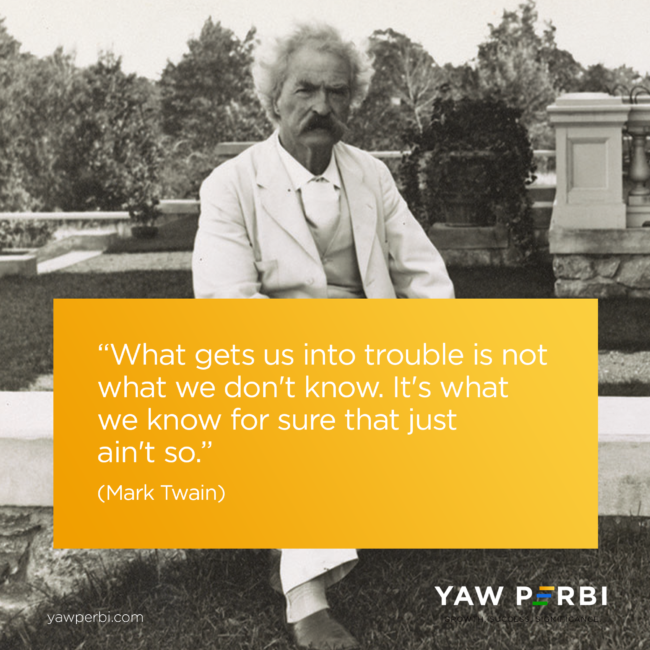
A Way to Prevent Heartbreak: Clarify Expectations
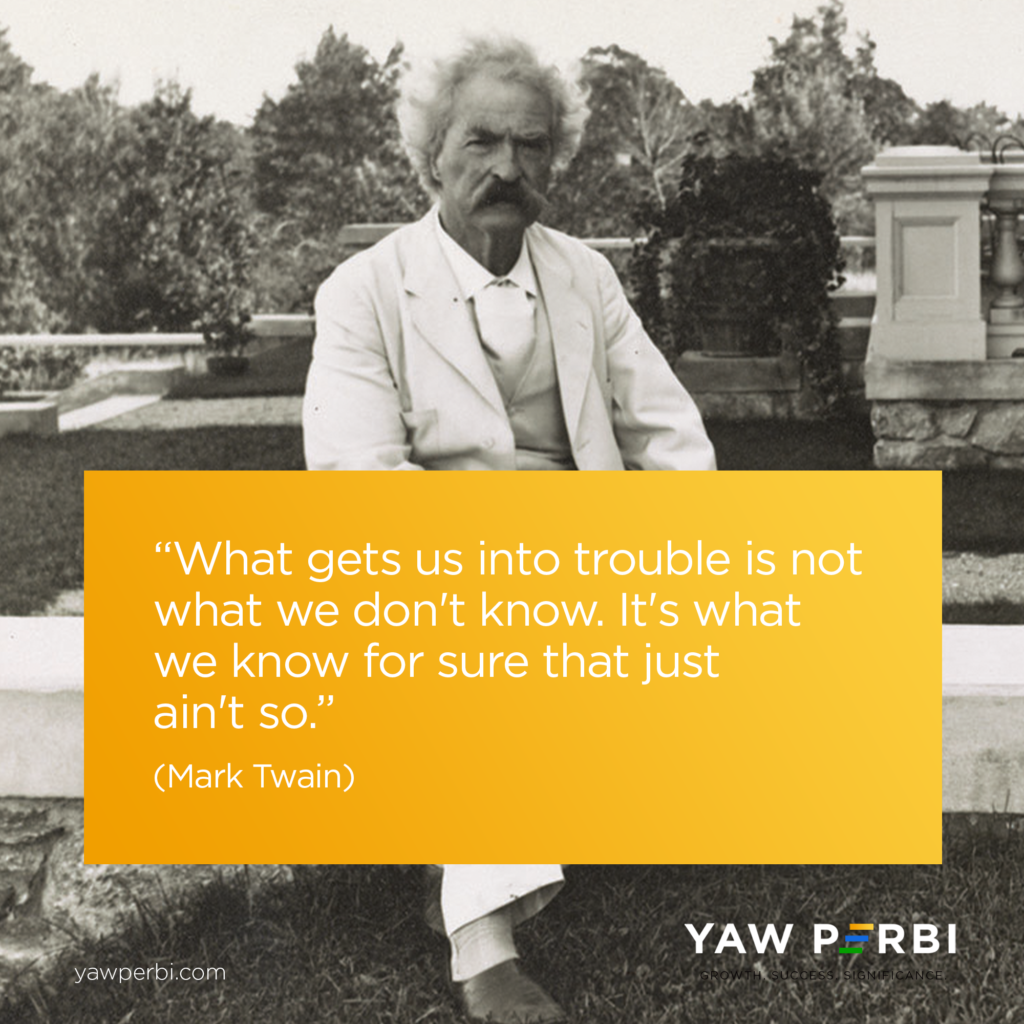
While what you don’t know may kill you; what you think you know but really don’t may kill you faster!
I have wanted to talk about this for months–how to prevent unnecessary hurt from unmet expectations–but last week an incident happened with one of my associates that really catalyzed me to share this urgently. So let’s talk about unmet expectations.
Whether it’s between spouses, parent and child, boss and workers or even among co-workers, family folk and church members, this is quite a common occurrence. This is particularly so African, Chinese, Japanese and Korean cultures that employ indirect communication. If you’re like me, you’ve probably been hurt before by unmet expectations. In fact, sometimes we don’t even realize we had an expectation until it was not met!
Mark Twain once said, “What gets us into trouble is not what we don’t know. It’s what we know for sure that just ain’t so.” We tend to have expectations that are unconscious, unrealistic, unspoken and unagreed upon. Let me share how you can flip these four things around and protect your heart against heartbreaks from unmet expectations. I owe this life-saving lesson from my New Yorkan mentors, Pete and Geri Scazzero.s
THE MILLION DOLLAR QUESTION
How do you know your expectations are valid or not? As hard-to-take as this may seem, when the expectation is unconscious it is invalid. In fact, if even we don’t even know we have them until we are disappointed how on earth is the other person supposed to know and meet it? When it is unrealistic it is invalid as well. Even if it is reasonable and we are conscious of it but it has not been articulated, it is still invalid. The common lame excuse we tend to give is, “Oh, but they should know?!”
In the event that our expectations meet all the above three criteria–conscious, realistic, spoken–but the other party has not agreed to them, they are still invalid. While this may seem very Western, I have learnt as an African-Canadian that it is never wise to assume agreement!
Of course, important caveats include marriage (where the vows already spoken have created certain clear expectations like fidelity), parent-child relationships (expectation of chores) and employer-employee dynamics where expectations have been clearly laid out in contracts and policy and supposedly read and accented to. Even in these relationships with broad-stroke expectations, situations occur that demand clarifying expectations further.
WHAT TO DO TO FORESTALL HEARTBREAKS
To prevent heartbreaks from unmet expectations, ensure your expectations are:
(1) Conscious: I am aware of my expectation.
(2) Realistic: I have evidence to support that the expectation is reasonable in the sense that the other is able and willing.
(3) Spoken: I have expressed the expectation clearly.
(4) Agreed Upon: The other person has agreed to the expectation by saying “yes.”
I would highly recommend you take the Scazzero’s Emotionally Healthy Relationships course for a full meal and good skill-building in this area they call Stop Mind Reading and Clarifying Expectations.
WHAT TO DO WHEN HURT HAPPENS
In the event that hurt still happens from unmet expectations, valid or not, REFRAMING the painful experience is everything. As John Maxwell renders it in the Law of Pain, “good management of bad experiences can lead to growth.” Reframe the painful experience as follows (modified from a Maxwell process):
a) Define the problem –> The painful situation I need to process right now is…
b) Understand your emotion –> My feelings about this are…
c) Articulate the lesson –> My lessons in is this are…
d) Identify a desired change –> The changes I want to effect are…
e) Brainstorm numerous pathways –> The ways out are…
f) Receive others’ input –> What I’m learning from others is…
g) Implement a course of action –> My course of action is 1. Embrace the reality of pain 2. Learn my lesson(s) 3. Share my lessons 4. Change a. ______ b. ______ c. ______ d. _____.
CONCLUSION
You know what they say happens when you assume: you make an ass of u and me. An expectation is only valid when it is mutually agreed upon. Let’s do less heart damage by providing and demanding clear expectations of others. Let’s ensure in all our relationships that our expectations are conscious, realistic, articulated and agreed upon. And when things fall through the cracks and we feel the sting of pain from unmet expectations, let’s reframe the experience well so we can still grow and flourish.

I’m Serving Up: Here’s How.
Like leadership, there are umpteen definitions of culture. My favourite is the simplest. Culture, whether ethnic or corporate, is simply the way things are done here. How things are seen to be done at YAW PERBI is determined, like Apple or Android, by our unseen Operating System (OS). That OS or worldview feeds our beliefs, informs our values, which in turn determine our behaviour.
As we carry out our vision and mission, here are our 7 YP values and what they mean:
1. People. We value people: People come first; not stuff. People are the only creation that bear the imago Dei (image of God). That should mean something; everything.
a. We are aware that without people we are nothing.
b. We value relationships and foster community.
c. We grow people, clarifying their identity, giving them purpose, unearthing gifts, nourishing persons to flourish.
d. We pride in, promote and protect family.
e. We offer high care to our clientele, with a great deal of empathy.
f. Our exceptional client experience leaves them feeling wonderfully valued.
2. Growth. We value growth: We grow or die. There’s no middle way.
a. We invest in ourselves and invest in others’ growth; continually.
b. We are sworn to lifelong learning in a diverse community till we die.
c. We strive to be knowledgeable and enlightened in order to succeed.
d. We expect pain to be associated with grown and have made peace with the fact.
3. Particularity. We value particularity: One size doesn’t fit all. Each client is different and has a unique life story and makeup.
a. We see and treat each person reverently, as wonderfully made.
b. We invest in getting to know our clients’ life stories, identity, purpose, and SHAPE.
c. We honour the above (a & b) by customizing our offerings.
d. We provide tools to discover and affirm uniqueness of each client and match them to the appropriate relationships and resources.
e. We pride in and promote the prestige of the executive class.
4. Excellence. We value excellence: We go above and beyond.
a. We exceed expectations as a habit.
b. We work hard and play hard.
c. We take our word and commitments seriously.
d. We do not compromise on quality–it is a virtue.
e. We do anything that is worth doing, well.
5. Success. We value success: We are passionate about all-round prosperity.
a. We are committed to the progressive realization of worthy goals and ideals; our clients’ goals are ours.
b. We inspire and motivate ourselves and our clientele to see and seize their dreams.
c. We long for holistic success.
d. We are victory connoisseurs.
6. Authenticity. We value authenticity: No fake folks or fake news, no fake products or services.
a. We lead, coach, author, speak and train with integrity.
b. We are truthful about ourselves and our offerings.
c. We can be trusted.
d. Our ways and means are proven to produce desired results. What we promote works.
e. We are in public who we are in private.
f. We are holistic in thinking and living, in our being and doing.
g. We strive to live and lead such that those who know us and love us the best (family and friends) respect us the most.
7. Significance. We value significance: We live to ‘make a dent in the universe’.
a. We look outward, beyond ourselves.
b. We work towards things that benefit communities, nations and generations.
c. We are inspired by the thought that our best works will outlive us.
d. We bear in mind that only what is done for God’s glory by God’s grace will last.
WHAT’S COOKING & HOW WE’RE SERVING
So now, you don’t only know our menu–the vision and mission–you also know the manner in which we plan to dish it all out. I’m serving up. Take a seat.
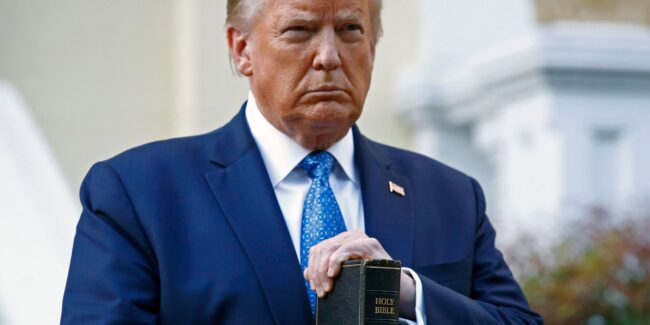
His Hair and Our Beards: Trump, a Global Leadership Crisis and our Children
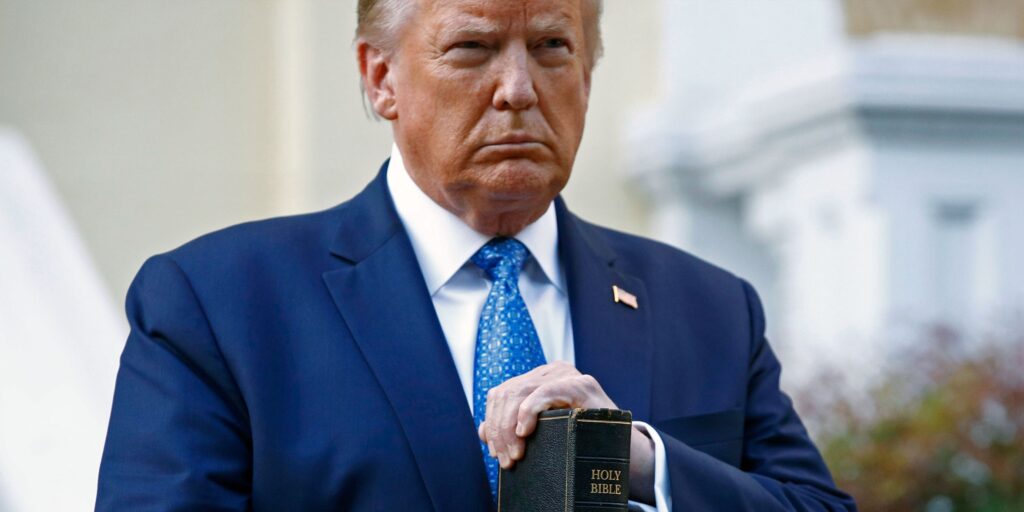
President Trump propping up a book that could flip his life and leadership if he would read and apply it. Same is true for us all! (Photo credit: The New Yorker)
“Stopping Trump is a short-term solution. The long-term solution, and it will be more difficult, is fixing the educational system that has created so many people ignorant enough to vote for Trump.” (Andy Borowitz, a satirist)
Let me begin with a disclaimer: I do not subscribe to the notion that everyone who voted for Trump is ignorant. That would be an unfair characterization. Politics is more nuanced than that. I say there are at least 3 Ps that go into one’s choice, none of which is perfect in any political party and hardly are all three aligned with what is Biblical: the PERSON (as in flag bearer), the PARTY and the POLICIES.
Having said that, how did the most powerful nation in the world end up with such a leadership crisis? I’m not just talking about the nail-biting U.S. electoral college vote count last week and the current situation where a winner has been projected but the incumbent hasn’t gathered what it takes to concede and congratulate. I speak of four years ago when America had to choose between two wannabe leaders of the free world both of whom the electorate had serious reservations about! America was caught between the red devil and the deep blue sea.
And the last four years have portrayed nearly everything I’ve been taught that leadership is NOT exhibited by the man in the White House. Is it competence in inspiring confidence about the Coronavirus pandemic and quenching it or a character of what is good and right and true or care and respect for ‘the other’? Competence, character and care constitute the DNA of leadership. Of course Trump did do some good things. I have even admired his non-political-correctness and tough skin in forging ahead buoyed by the courage of his convictions (no matter how misinformed I think they might be sometimes). By and large, however, I have had to repeatedly tell my children too many things about Trump that leadership is NOT.
THE VAN JONES MOMENT
When I saw Van Jones weep on television that as a parent the defeat of Trump and the elevation of Biden is a testament to the fact that character matters in life and leadership, I very much identified with that. Character matters. Truth matters. Decency matters. And one would think the white evangelical church in America would know better than a journalist.
If the one country that has produced the most world-impacting heads of states, Nobel laureates (390 of them; the UK which is next is at 135), stellar entertainers and astounding professional athletes could face such a gaping leadership crisis then the rest of the world had better watch out. In my Twi language from Ghana, there is a saying that when you see your neighbor’s beard on fire, you had better quickly fetch a bucket of water and place it beside yours (well, hopefully after you’ve helped him doust his!)
OF SHITTY STORIES & SHIT HOLE COUNTRIES
The S word is one that isn’t in my vocabulary. Permit me to get into the gutters in this little stretch so we both appreciate the abyss leadership sunk into these last four years. When Trump was elected I was hopeful. My family’s explanation to a United States border agent that we were crossing over from Canada to upstate New York to check on our investment property had been described by this kid in the border cage as “Such a Shitty Story.” When I wrote about that in January 2017, I was hopeful that a Trump presidency would catalyze the noble dreams Martin Luther King Jnr. had for his four little children (and my six) and not turn into the nightmare many feared. The latter has happened. Blacks still can’t breathe in 2020, George Floyd’s slow slaughter being the epitome of that.
As one born and raised in Africa I have long experienced firsthand that “everything rises and falls on leadership.” Whether as a young medical doctor in Ghana seeing patients die who shouldn’t have or as a United Nations peacekeeping soldier in Cote d’Ivoire beholding with my own naked eyes the ravages of war, there is no other one word that summarizes all that’s wrong with my continent as ‘leadership.’ The sad socioeconomic state in the midst of abundance earned us the disparaging title of “Shit hole countries” by President Donald Trump who ironically has gone ahead to look, sound and act in the very manner people who have misled, unled, disled Africa have.
START EARLY
Leadership is a sacred trust. Twenty years ago I was so concerned that leadership knowledge and mindset, character and skills be acquired early that I co-founded The HuD Group to intervene at the youth level and change the African narrative. Nearly 20 years later I am still convinced that leadership development and training must start early but even earlier: with children. And it begins by calling them “cubs” who will grow into lions and not “kids” who will grow into billy goats gruff (or the trolls in that fairy tale, for that matter LOL).
While at my executive education company that bears my name, YAW PERBI, we’re intervening at the C-Level, Perbi Cubs Library Services is beginning from the very roots: with children and from our homes and schools. I’ll tell you why we launched the Lions In Training (LIT) Track at Perbi Cubs only a couple of weeks ago (although we’ve been dreaming about this for a long long time).
WHY LIT?
LIT is the collective attempt of Perbi Cubs and parents who are preparing the next generation to meet the great challenges and opportunities of the twenty-first century and thrive! The LIT track is to help groom our Cubs into holistic Leaders (Lions). The Perbi Cubs reading community knows that the future of our reading Cubs is promising because of the world of opportunities opened to them every day as they open books to read. For sure, readers are leaders.
Reading, however, is necessary but not sufficient.In this light, Perbi Cubs desires to partner parents to nurture Cubs in relevant soft skills that will take them places and form them into young well-rounded leaders of great impact. Research shows that a leader is developed over the entire course of their life: from womb to tomb. It is never too late to start teaching, learning and applying leadership skills to everyday life.
Next, I’ll show you HOW we’re going about it. For now remember, Trump’s orange hair is on fire; we all had better get a bucketload of godly, effectual leadership to sit by our beards!
*NB: YAW PERBI serves as consultant, coach and trainer for Perbi Cubs and is not involved in the day to day management of this groundbreaking social enterprise. If you require YAW PERBI’s assistance in executive coaching, management consulting or leadership training reach out to yawperbi@gmail.com.
COVIDic Times: One of the Best Gifts Ever!
So I just came on sabbatical. The best gift of week 1 was sleep–day time sleep! It was good for the body, really good. Then the next week came and its gift really took care of my soul. I got re-connected with my teenage friends from around the world, from every continent! Many of them I had lost touch with for 24 years!

With my 50 friends from 50 different countries in front of the national museum in Taipei, Taiwan. The year was 1996.
THE END FROM THE BEGINNING
I started life backwards. Sort of. Usually people fool around in their teens and when they are all grown up–mature (whatever that means), prim, proper, and seasoned–become ambassadors of their countries. I became an ambassador for Ghana in my late teens, a youth ambassador, together with 50 other World Vision Youth Ambassadors from 50 different countries! As a strapping 18-year old, that experience would irreversibly enlarge my heart; and it has never been able to shrink back into being merely Akan or just Ghanaian or even only African. Never. I’ve been a global citizen since the mid-90s, or a ‘world class Christian’ as my mentor Paul Borthwick would put it, and yet at the time I did not even yet quite understand how much God is a global God on a mission, as I do today.
Connecting the dots, it might no longer come as a surprise then that a couple of decades later I’ve been to 45 countries and lived for a year or more in three, worked with the United Nations, founded and expanded The HuD Group to two dozen countries on each continent, pastored an English-speaking Chinese church in a French city (Montreal) in North America (Canada) and spent my last seven years as president of International Student Ministries Canada, empowering international students to impact the world through Jesus Christ. WVYA was my second experience as an international student, the first being as an exchange student from Achimota School in Accra to Ballard High School in Louisville (Kentucky, USA), the year prior. Being a World Vision Youth Ambassador in 1996 is a gift that keeps giving, like this last couple of weeks!
THE CHANG CHALLENGE
How I got selected as the World Vision Youth Ambassador for Ghana was a miracle, divine. I will leave that story for another time, lest I digress. WVYA was a phenomenal idea birthed by Dr. Jerry Chang, then World Vision Taiwan CEO to bring together 50 young people from 50 different countries to pursue and promote life’s common grounds, universal values. We would study conflict prevention, justice, peace, unity, reconciliation etc. and embody all of this as we constitute a choir travelling the world with this message of unity in diversity. For six weeks this group would live together as global community doing all the philosophical as well as musical studies, and then for the next six weeks tour Taiwan (the host) and other countries. 1995 was the debut year. In my year, we got to tour Taiwan, the USA (New York, Washington DC, Los Angeles, Seattle), Mexico and Canada. The 1997 cohort’s countries were Taiwan, Japan, USA and Guatemala (I got to do that tour too, as I’ll explain shortly below). In all, the programme run for five years–1995, 1996, 1997, 1998, 1999 and with a combined finale of selected previous ambassadors in 2000–resulting in 245 youth ambassadors from 61 countries in total.
THROW BACK
A couple of weeks ago I was contacted by Claudia Sofia, who was the ’96 Colombia Ambassador in my cohort, that the 1997 year group was planning an online reunion and had requested her and me to co-facilitate. She, together with a few of them, did such a splendid preparatory job that I didn’t have much to take care of, really. The thing about Claudia and I is that we were the two out of our group of 51 in 1996 who were selected by the WVYA staff and invited back as staff interns for the following year’s programme so we are very familiar with both 1996ers and 1997ers. Claudia and I reunited about eight years ago when her family temporarily relocated to Canada where I’ve been living and serving with my family since 2009. We have not only been in touch since but have for the last five years worked together on leader development globally and in Latin America in particular through The HuD Group.
It was amazing seeing all these WVYA ’97ers on the Sunday July 5 call; and the cherry on top was the presence of Mama Chang, the 94-year old matriarch, wife of WVYA founder. Inspired by the 1997 gathering, Claudia and I got to work on a WhatsApp group to rally the 51 youth ambassadors of 1996. To cut a long story short, in the last two weeks not only have we found (with CIA, Interpol and Scotland Yard skills) 48 of the 51 Youth Ambassadors and corralled everyone into the same WhatsApp group we have also held two online Zoom reunions (July 11 and July 18), affording everyone to reminisce the past, provide a current update and begin a conversation about re-imagining the future. At the time of writing this, all the other year groups have already met except 1995 (in the offing).

A sample of our classic pre-concert posters. We were famous across Taiwan; then New York City, Washington DC, Mexico City (Mexico), Los Angeles (USA), Seattle (USA), and Vancouver (Canada).
WHY NOW? PANDEMIC BLESSING
The various year groups have had mini reunions here and there over the last two decades; and even in 2015 I was privileged to be part of a cross-cohort mini reunion in Prague but never have we been able to gather this many people together all at once. What’s the difference? COVID-19!! As Rodrigo (Mexico) and Li-Hoon (Singapore) put it bluntly during the first 96ers reunion call: “THANK YOU COVID!”
So why and how come this significant reunion at such a time as this? In the first place, we’re all no longer busy bigwigs criss-crossing the planet about our all-important affairs. We have every one’s attention and no one’s going anywhere. Secondly, the lockdown’s making many of us begin to feel lonely; we are seeking community, even if it’s online. Thirdly, COVID-19 and its ramifications is making us more contemplative and asking what really matters in life. We’ve been glad to pick up memories and rekindle friendships we inadvertently dropped. Fourthly, this pandemic has changed the way we think! Hitherto, we would’ve been seriously planning a ‘big’ physical reunion with all the limitations of time, air travel expense, visa drama, hosting logistics etc. How come it’s never occurred to us in 24 years to hold an ONLINE REUNION?! How hard is that?! But it just wasn’t in our mental framework. And don’t forget, in 1996 when we were teenagers and formed these relationships, smart phones didn’t exist and the internet and email had barely become available to us commoners. Our brains may have only associated each other with snail mail and a fine opportunity for stamp collection.
But the last reason may be the most important of all. The world has turned pretty ugly in the last little while with bigotry, racism and a certain brand of unrestrained nationalism. All of these have been heightened during this pandemic, coming to a head with the unjust death of George Floyd and the mass protests that it sparked all over the world on every continent, calling for racial equality and justice. As I mentioned on the WVYA ’97ers call, it seems to me that although we all knew our mission of peace, love, reconciliation and unity in the world was important back in the 1990s (after all my sweetheart Duda, for instance, took solace in playing piano among the bombs blasting in the Bosnian war), I still feel Papa Chang had so much vision that WVYA rather is an idea whose time has now come, 25 years later.
It was at WVYA that I learnt not only in song that “we teach the young our difference but look how we’re the same” but lived that reality among 50 other nationals for three months. My conclusion as a (maybe precocious) teenager was: we have much more in common than we are different. In fact, it wasn’t until about six weeks into the programme that the thought first even crossed my mind: I am Black. It hadn’t mattered. At all.

We got to sing the American national anthem at the start of a New York Yankees game. Danny Devito threw the first pitch.
BACK TO THE FUTURE
Danish philosopher Soren Kierkegaard aptly said, “Life can only be understood backwards, but it must be lived forwards.” As I reconnect (in order of recent rediscovery and rallying onto WhatsApp) with Claudia (Colombia), Tom (Uganda/currently domiciled in England), Isobel (Ireland/France), Nayunda (Zambia), Carolina (Hong Kong/UK), Li Hoon (Singapore), Ivyn my roommate (Sri Lanka), Henrietta (Zimbabwe/USA), Isariya (Thailand), Esther (New Zealand), Panha (Cambodia), Ginger (USA), Jeffrey (Costa Rica), Nashipai (Kenya), Joyce (Lebanon/Canada), Wilge (Bolivia/USA), Greg (Taiwan), Lara (Canada/USA), Nino (Georgia), Haime (Philippines), Nelson (Papua New Guinea), Duda (Bosnia & Herzegovina), Yayoi (Japan), Janneke (Netherlands), Arnold (Honduras/Mozambique), Anielka (Nicaragua/USA), Rodrigo (Mexico), Mirjam (Germany), Carlos (Ecuador/USA), Derese (Ethiopia/USA), Sinara (Dominican Republic/Bulgaria), Ariel (Chile), Luis (Guatemala), Pamela (India), Cornel (Romania/Canada), Annie (Malawi), Fikile (Swaziland/South Africa), Pierrick (Switzerland), Young Suk (South Korea), Simon (Bangladesh/Canada), Mpho (Botswana), Davi (Brazil/Uruguay), Romed (Tanzania), Ghassan (Palestine), Angelina (Russia), and Rytha (DR Congo), I’m also connecting the dots.

A Zoom screenshot of half of us staff and ’96 ambassadors on the first reunion call on July 11, 2020. This is the kind of image of equality and togetherness that the world ought to be seeing much much of.
I believe Bobby Clinton was right, that “God develops a leader over the entire course of their lives” and He sure lays down “sovereign foundations,” like WVYA, for His purposes in each of us in every generation. I could never have chosen this life, but I love it! More importantly, I love the One who did and all these nationals He has brought my way! Again, my heart expanded and has never been able to shrink back since.
Guess who else was right? Papa Chang. Today we are the wives and husbands, fathers and mothers, professors, CEOs, homemakers, celebrated performers (choral, gospel, jazz, opera), members of parliament, government ministers etc. of change, “doing our little thing in our little corners” as Mama Chang exhorted on the July 11 call. But guess what? Now that COVID-19 has brought all these little embers together, who knows what worldwide bonfire may start. World, watch out! for as Victor Hugo once remarked: “You can resist an invading army; you cannot resist an idea whose time has come.”
COVIDicTimes: Building to last in a pandemic
Everyone knows this is a hard time to live and even more so a jolly harder time to lead. A couple of thoughts and tools have been most helpful in my own leadership struggle to survive the pandemic and tussle to thrive beyond it.

Surviving and even thriving in the very place of crisis (Photo credit: accdocket.com)
This is worth repeating although people in my circles might be tired of hearing me sound like a broken record: a pandemic is a terrible thing to waste. It tends to be once-in-a-lifetime, nay, once every 100 or so years, for crying out loud! That notion of not squandering the opportunity in crises was most eloquently quipped in recent years by Stanford economist Paul Romer at a venture-capitalist meeting in November 2004 in California when he said, “A crisis is a terrible thing to waste.” According to the The New York Times Magazine, “he was referring to the increasing competition that America faces from rapidly rising education levels in other countries.” How much more COVID-19!
As a leadership practitioner in the global sphere, I’ve found myself in various groups discussing both gut reactions and measured responses to the pandemic. I have been particularly intrigued by the notion that COVID-19 is not just a passing blizzard but a long winter, even possibly a mini ice-age. I first heard it from my mentor of nearly 20 years who is currently the Finance Minister of the Republic of Ghana, Ken Ofori-Atta. In his Financial Times article that prayerfully ponders a restoration of GDPs to structural changes that need to happen from digitalization to debt issues, he prophesies: “This is not a passing blizzard, as a friend said; more like a long winter, even a mini ice age.”
Similar words were used by Andy Crouch et al. In summarizing their Leading Beyond the Blizzard: Why Every Organization is Now a Startup article, the above words from Ofori-Atta were echoed: “The novel coronavirus is not just something for leaders to “get through” for a few days or weeks. Instead, we need to treat COVID-19 as an economic and cultural blizzard, winter, and beginning of a “little ice age” — a once-in-a-lifetime change that is likely to affect our lives and organizations for years.”
So how do we live and lead (tactics) in the immediate to survive the vagaries of the current season yet be and do in a way that enables us to thrive beyond the pandemic (strategy). I’ve found the following thoughts and tools most helpful.
1. TRIAGE TO LIVE THROUGH THE PANDEMIC
As a Ghanaian, the month of May holds both the joys of May Day (workers’ holiday; equivalent of Lab(o)ur Day) and the pains of the May 9 stadium disaster that took the lives of 126 people in 2001. As all hands were called on deck that fateful day, ordinary folks drove to my medical school to implore medical students to come over and do whatever we could to help salvage endangered lives from the stampede that had ensued at the capital’s stadium. One of the necessary evils of medical practice is triaging in disaster. This is “the assignment of degrees of urgency to wounds or illnesses to decide the order of treatment of a large number of patients or casualties.” The word “triage” for grouping patients based on the severity of their injuries and the likelihood of their survival comes from the French word “trier” which means “to sort.” As a doctor I can tell you that usually it’s not the ones shouting the loudest that need the most urgent care but often the ones dying slowly in silence, perhaps haemorrhaging away.
What has this got to do with leading well in this COVID-19 pandemic? Well, while the mission of your organization wouldn’t change; your methods not only can, they should. The pandemic offers the kairos moment and clarity to triage, to sort through what must be given urgent care or otherwise. There are things that should become even more of a priority now in this pandemic; some that have emerged out of the blue and others that should be honoured as having served their purpose and honourably let go.
I have personally found the following ‘Strategy Triage Tool’ introduced in an April 30 Vision Synergy online workshop I was in most helpful. Hope you do too.
2. INNOVATE TO OUTLIVE THE PANDEMIC
“Necessity is the mother of invention,” so the old adage goes. And indeed, when the need for something becomes imperative, human beings are forced to find ways to get things done in a manner they wouldn’t have otherwise without this compelling force. I have witnessed more appropriate technological innovations on the African continent since the COVID-19 pandemic than I have my whole life!, everything from solar-powered soap-dispensing hand washing sinks through contact tracing mobile apps to pool testing of lab samples for coronaviruses. In the various organizations I’m a part of, I’ve seen many innovations things from cooking together in real time on Zoom to collaborative music videos of people continents apart.
 My excitement about crisis-birthed innovations was tampered though by wise words from my super smart fellow Fellow of the Africa Leadership Initiative (ALI), Bright Simons. Hear him: “Survival instincts do spur innovation during crises. But some crisis-spun innovations fail to position organisations well for the eventual recovery. For example, improved food canning and other preservation techniques became a mainstream strategy during World War II, but not the distributed “home canning” opportunities some, such as the Bernadin Bottle Cap Company, bet their fortunes on. The strong surge simply fizzled out in the post-war years. If an emergency forces new thinking that leads to new product and service lines, it may be worth your while to contemplate how you can “stretch out” the adaptive investments to sustain your edge into the recovery phase, with your primary focus on scaling when the constraints are less likely to lead to burnout.”
My excitement about crisis-birthed innovations was tampered though by wise words from my super smart fellow Fellow of the Africa Leadership Initiative (ALI), Bright Simons. Hear him: “Survival instincts do spur innovation during crises. But some crisis-spun innovations fail to position organisations well for the eventual recovery. For example, improved food canning and other preservation techniques became a mainstream strategy during World War II, but not the distributed “home canning” opportunities some, such as the Bernadin Bottle Cap Company, bet their fortunes on. The strong surge simply fizzled out in the post-war years. If an emergency forces new thinking that leads to new product and service lines, it may be worth your while to contemplate how you can “stretch out” the adaptive investments to sustain your edge into the recovery phase, with your primary focus on scaling when the constraints are less likely to lead to burnout.”
In demonstrating how we can “stretch out” the adaptive investments of COVID-19 so that our innovations can outlive the pandemic, Simons offers the illustration below.
The excellent COVID-19 analysis in this scenario planning PowerPoint by UC Berkeley professor Steven Weber and Arik Ben-Zvi (CEO of Breakwater Strategy) has also been a cherished gift. It is helpful that the duo have put a lot of thinking into various possible scenarios from total triumph to downright disaster, enabling leaders to conserve our energies to take care of the resulting so whats and then what’s for our own contexts and constituencies. Cross out America and the tool is pretty good for anywhere in the world that has been hit by COVID-19, which is everywhere.
FINALLY
So yes, any crisis is a terrible thing to waste, especially a pandemic of current proportions. In our bid to live and lead, may we do so well in order not only to merely survive the moment but to even outlast it. May posterity arise and salute the Covid-containing and Covid-conquering champions that we are, in the making.
COVIDic Times: Leading in Times Like These.

If ever leadership was needed it is now. (Photo credit: MIT Sloan Management Review)
John Maxwell stated that “everything rise and fall with leadership”. In order words, when it works, thank leadership. When it fails, hold leadership responsible. What has leadership got to do with COVID-19? Everything actually! Infact COVID-19 is so named because it started in 2019! Guess what? This is April 2020 and our leaders are now running all over the place as if we were not giving adequate time to prepare for a response!
Is this not the attitude that is prevalent in the church as well? As I have stated many times, the current generation of leaders manufacture one product very well without having to built a factory – excuses! This is sadly the legacy being handed over to the younger generation. As a matter of fact, the younger folks have mastered it so well to the chagrin of the older folks.
In the light of this pandemic, how should the younger generation respond and prepare for the future?
- Take responsibility and lead – Leadership is work, not a title and definitely not a position. Several lives have been lost and many may still be lost needlessly because leaders of nations looked the other way when they were supposed to formulate a policy, closed the borders and scrutinize every person who is eventually allowed to enter. If this was done, what should have happened is lockout and NOT lockdown.
- Lead with facts not just emotions – Can you believe that even now many people are still of the opinion that they need not do anything extra to be safe? In fact, there probably are more jokes and video clips out there than there are statistical data that could help curtail this scourge. When it comes to consolidating systems, we quickly get tired and wonder why the stress! We suggest a ‘short cut’, an easier approach, anything that provides without effort. What the short cuts lead to, is a longer journey that we wish we never embarked on.
- Lead together not alone – It is very clear that the only way to deal with this pandemic is for everyone to work together. The days of lone rangers are over and as younger leaders we should quickly recognize the power of togetherness. I have often argued that the work given by God to anyone is usually bigger than what the person can do alone! Why? So that in doing the work together with other people, only God takes the glory.
Kehinde Ojo lives in Abuja, Nigeria. He currently serves as the Program Director of the Indigenous Support Development program of IFES (International Fellowship of Evangelical Students) and also Co-Catalyst of the Ministry Fundraising Network of the Lausanne Movement.
COVIDic Times: AN EASTER CELEBRATION WITH A DIFFERENCE!
By
Dr. Susie Ubomba-Jaswa
In a matter of a few shorts weeks COVID-19 has totally changed life as we know it in virtually every nation on the globe? What on earth is going on in the world? Is Someone trying to get our attention? Will we heed?
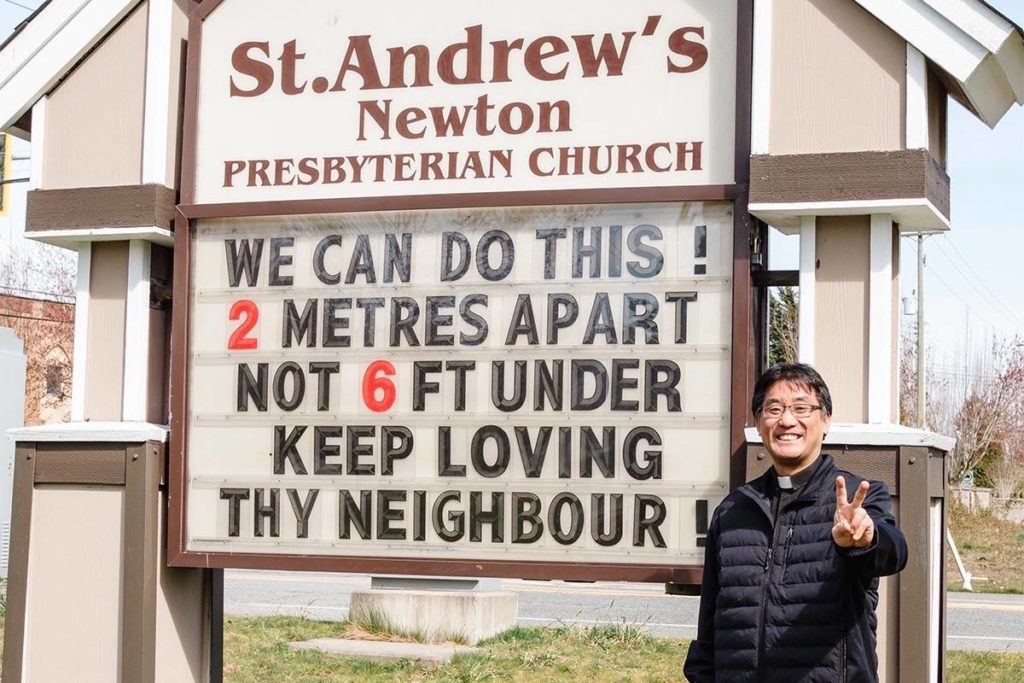
Rev. Geof Jay with one of his many witty COVID-19 related community messages posted in past weeks outside his church in Surrey, BC. (Photo: Olivia R. Jay)
A month ago very few, if any, persons in the world would have imagined or expected this very bizzare, complex, unpleasant global melt down. Within a matter of weeks, the COVID-19 pandemic has essentially changed the health, social, religious, economic, etc. landscape of every nation in the world for the worst.
Previous scarcely used words such as corona, virus, mask, sanitizer, social distancing, self isolation, quarantine, etc. are now on the lips of young and old; rural and urban. Who can even dare mention the current and future positive effects (individuals and organisations that are making and will make millions from the sale of masks, sanitizers, vaccines, all types of supplies, medications, etc.) of this grave pandemic? But clearly the disastrous negative impacts are affecting every individual of the world’s almost 8 billion persons. Even babies born today sadly will not receive the hundred percent joy their parents and relations would ordinarily have welcomed them with. Why? Because the fear and uncertainties at the back of their minds will consciously or otherwise erode some of that happiness. How sad!!!
QUESTIONS GALORE
Naturally the question we are all asking is: what on earth is going on in the world; how come a virus invisible to the naked eye has such a devastating crippling effect on the world with the speed at which people are getting infected and dying? Expectedly a wide range of causes or sources of the infections continue to be spewed all around the world. Thanks to electronic media they move, like the virus, with wild fire.
Whilst the experts are disseminating information about the scientific source and current knowledge of the epidemiology of COVID-19 we are also confronted with tons of messages, videos, pictures, etc. that may be scientific; or not so scientific; half-truths; propaganda, hoax, fake news; etc. Let me try and roughly categorise some of the circulating electronic materials I have read or glanced through:
- Direct plague from God to punish the world: sin is multiplying. Similar to Noah and the Flood; Sodom and Gomorrah; Pharaoh and the Egyptians; Moses and the snakes; numerous plagues mentioned in the Bible.
- The apocalypse: Antichrist; one world religion; second coming of Christ; end of the world.
- Virus transmission: animal to human – from bats, cats, rats, etc.; human to human.
- Laboratory experiments: the effects of scientific experiments horribly gone wrong.
- Biological weapon: deliberate creation of a mild or aggressive biological weapon aimed at specific groups or whole world population.
- Depopulation weapon: deliberate attempt to reduce world population – fertility and destruction of marriage and family life are not too effective hence through morbidity and mortality. For eugenics and environmental reasons.
- Economic: money making; deliberate creation of a disease in order to provide necessary supplies – medical, equipment, etc.
- Technology: creation, testing and use of advanced technologies – complexities of radiation from devices especially 5G and its link to economic, political world power; the reign of artificial intelligence and its impact on the different aspects of human life; insertion of micro chip in humans. Using pandemic as smoke screen.
Where is the truth in all these? The bottom-line is whilst waiting for the truth, if ever we will know it, they are all instilling confusion, anxiety, fear, hopelessness in individuals and governments. In unison we do agree that there is a worldwide disaster. Yes, indeed a world war without guns, bombs and ammunitions and our common enemy, seriously, is a VIRUS!? It is comforting to note that generally people are adhering to the suggested and compulsory measures as individuals and groups to contain and reduce the spread of COVID-19. We salute the health and other workers – paid and voluntary who are at the forefront caring for patients and managing those who succumb to the disease. Very heartbreaking.
BOTTOMLINE
Whether COVID-19 is a plague from God, the end of the world or a man-made catastrophe with distressing effects, a theme that is echoing in personal conversations and variety of electronic messages is that God is speaking; He is trying to get the attention of human beings. Hence in addition to all the numerous beneficial pieces of information we are being reminded of or we are learning from for the first time, I think we should learn some spiritual lessons from and during these perilous times.
Personally I find it fascinating that this global Lockdown is peaking around the time of the christian festival – Easter. Unlike Christmas, Easter tends to produce a solemn, gloomy, sad, mourning ambiance. We all know that the sights of a corpse and the associated settings such as a coffin are heart-shattering. We buried a very good friend of mine a couple of weeks ago!!! And most of us are watching the frightful pictures from China, Iran, Italy, Spain, USA, etc. of the devastation of COVID-19 (even TV reporters tend to give warning to the faint hearted).
We are in the Easter week where we remember Palm Sunday, the Death and Resurrection of our Lord Jesus Christ. Yes, granted, Easter is not celebrated in all countries of the world but for those that do, the celebration of Easter 2020 will be a shocker to all!! Unprecedented in the lifetime of many of us. There will be no physical church services (imagine the empty chapels, cathedrals, auditoriums, tents, parks, etc.); no religious fun fares, parades, retreats, camps, conventions, etc.; no pilgrimages to national and international holy sites; no trooping of visitors particularly to Jerusalem or Rome.
In trying to make sense of it all perhaps as individuals we should also make Easter 2020 unique for ourselves. For many of us we have never read, on our own, at a sitting, the whole Easter story – the last weeks of Jesus on earth. We tend to read pieces on our own and most often from church. Let’s take the challenge – open the Bible and read the passages on the last weeks of Jesus from the Gospels (Matthew, Mark, Luke and John). For those who do not have personal Bibles, you can Google well known versions such as New International Version, from the internet. After all we have lots of time during this lockdown to do some long readings.
I am encouraging us to do this because first, the lockdown has literally forced us to have ample time now. We often indicate we do not have enough time. Secondly, this is an opportunity to read the Easter story on our own, for our self and from the source rather than listening to and reading pieces from other people – religious or otherwise.
We are all asking questions. Even children (at their own level) are conscious of the abnormal situation we live in and are asking questions or reacting to it in their own way. As adults we tend to feel confused, anxious and scared about the present and more so the future. But we are acutely aware that there are more questions than answers bouncing around especially from electronic media. Therefore, my third reason is that this period provides us with some quietness to pause and ponder about serious issues in our lives and fill our minds with some refreshing and trustworthy information from the Bible.
MANY WALKS OF LIFE BUT ONE WAY TO LIFE
Thanks to people like Thomas who do not keep their doubts and uncertainties to themselves but ask questions they genuinely need answers on. For it was in response to Thomas’ question in John 14:5 – “Lord, we don’t know where you are going, so how can we know the way?” that Jesus made one of his profound statements in John 14:6 – “I am the Way and the Truth and the Life. No one comes to the Father except through me”. It is worth noting that Jesus did not say I am the only way trying to caution that there may be possible ways. No! By saying I am the Way, He implied that if you are interested in going to the Father (God), then come through me. If you want to know the truth, then listen to me. And if you are interested in being alive then follow Me.
Why did Jesus call Himself the Way, the Truth and the Life in relation to God? Jesus did that because He is the Saviour (meaning of the name Jesus). His purpose of coming to be born and live on planet earth is to save mankind from what happened with the Devil, Eve, Adam and God’s punishment of death in the Garden of Eden. Why does mankind need a saviour if nothing evil has happened to them? God’s hatred of evil is manifested throughout the Bible with all types of associated punishment. Jesus’ life and teachings highlighted not only the love of God but also the reality of evil (sin – disobedience to God and obedience to the Devil) and its consequences.
It is important to mention that when God drove away Adam and Eve from Eden, He did not take away from them all the blessings He had showered upon them whilst they lived there. They also went away with whatever they gained from eating fruit from the tree of knowledge of good and evil. On top of these they came out with the Death punishment, as a result of obeying the Devil, hanging on them. Therefore, it does not come as a surprise that Jesus’ mission is to bring us back to the Father by DYING for us.
In Jesus we are reminded of what took place in Eden, as well as the provision God made available in order for us to come back to him. To prove the truth that God still loves mankind and has provided forgiveness for us through Jesus’ dying on the Cross, God gave His life back by RAISING Him from the dead. Since God did not take away human beings’ ability to choose, Jesus declares in the well known verses, “For God so loved the world that He gave His only Son, that whoever believes in Him shall not perish but have eternal life. For God did not send His Son into the world to condemn the world (mankind was already condemned in Eden), but to save the world through Him” (John 3:16&17).
The Easter story makes good sense of Jesus’ claim that He is the Way, the Truth and the Life. The way back to the Father; the truth regarding sin and its consequences, provision of forgiveness through Jesus’ death; and the life He gave through His resurrection that indeed we were created to live forever with the Father. This is the Good News of God, the Gospel, that has over the centuries been shared and received globally by many from all walks of life. The spread and acceptance of the salvation of Jesus Christ is unstoppable all over the world. Likewise, the indifference towards and rejection of who Jesus is and His purpose of coming into the world also persist.
BRINGING IT HOME
From your deepest thoughts are you able to genuinely answer the question – which camp do you belong to? Referring to John 3:16 are you in the Eternal Life group or the Perish group? Praise the Lord if you are in the first group. Jesus’ teachings encourage those who choose Him to continue travelling on the Narrow way because at the end of it is Life (Heaven). On the other hand, those who do not choose Him (i.e. are indifferent or reject Him) are on the Broad way that leads to Destruction (Hell). One of the unique characteristics that runs through Jesus’ teaching on salvation is the fact that He always deals with two groups of people – this binary approach makes His teaching clear and not ambiguous. There is no sitting on the fence. You are either His follower or you are not. Why only two groups? Because Adam and Eve put all of us on the Broad way. Acceptance of Jesus takes us from the Broad way to the Narrow one.
In case you are not on the Narrow way, know that it is not late to leave the Broad way and join us on the Narrow way. The Easter message is that on Good Friday, Jesus died on the Cross to pay for our sin (disobedience to God) so that we can go back to God. He proved it on Easter Sunday through His resurrection from the dead that indeed there is forgiveness available for those who want to come back to the Father. One of the comforting sayings of Jesus is Luke 5:32 – “It is not the healthy who need a doctor, but the sick. I have not come to call the righteous, but sinners to repentance.” God the Father and Jesus Christ have played their part. As a person, I have to play my part by accepting the offer they give me – Jesus, the Way back to God.
Sometimes we wish that the Father will force all human beings to come to Him through the salvation He has provided in His Son. But that is not the case. He wants us to freely come to Him just as we are. He is waiting. The invitation is open until a person dies. So where do you want to spend life after your physical death – with the Father or with the Devil? Once again Jesus does not leave us guessing. He clearly teaches that Hell was created for the Devil and those who choose to obey and follow him.
The arrival of COVID-19 has shaken the world and vividly revealed how precarious our existence can be. Interestingly, Jesus extensively taught about the temporary nature of life on earth not only for individuals but for the whole of creation. He also taught about His second coming and the end of the world. And even though He did not give a date of His return or the end of the world His teachings provide several signs and pointers and tend to be intricately woven together and often referred to as the Apocalypse. The suddenness, the destruction and the sheer global impact of COVID-19 on all aspects of our daily lives have awakened up humanity.
Despite the uncertainties brought about by this pandemic, one thing we are assured of is that Jesus’ invitation still stands. His voice is not locked down. And the celebration of Easter (without all the relevant and not so relevant associated rituals) is once again reminding us of the demonstration of God’s love in calling us to leave the Broad way that leads to Hell and come to Him through the salvation He has provided in Jesus.
For those who have believed in Jesus and accepted Him as our Lord and Saviour, He is encouraging us to continue trusting in Him because He is the Truth. We should not let the fear of the unknown future – persecutions, pandemics, wars (physical, biological chemical, spiritual, etc.), new world order, one world religion, artificial intelligent god and church, negative effects of technology, increase of evil, rule of the Antichrist, Jesus’ second return, end of the world, etc. – overwhelm us and derail us from travelling on the Narrow way. We have chosen Eternal Life with the Father which Jesus explains to Martha and us in John 11:25&26, “I am the resurrection and the life; he who believes in Me will live, even though he dies. And everyone who lives and believes in Me will live, even though he dies”.
May we have a refreshing time with Jesus as we journey with Him to the Cross and up from the Grave to bring us Eternal Life.
_______________
The author holds a PhD degree in Medical Demography. She taught Demography, Research Methodology and Statistics in universities in Ghana and South Africa. She also worked for the South African civil service as a director in Health and Vital Statistics where she retired from. She is married with adult children and grand children. Susie committed her life to Jesus Christ as a teenager through the ministry of Scripture Union, Ghana.
COVIDic Times: SPATIAL DISTANCING; NOT SOCIAL.
We all know what is meant by the most popular phrase in the universe right now, ‘social distancing,’ but the term is unacceptable to me on at least three levels. I would rather go for the term ‘spatial distancing’ than ‘social distancing,’ and here’s why.
The world is in wartime mode, fighting a pandemic that hasn’t spared any country or territory on the globe and so this is not the moment to be squabbling over words. But for what it’s worth let me get this ‘social’ versus ‘spatial’ debate off my chest!
The COVID-19 formula to contain the pandemic locally and to ‘flatten the curve’ globally has mainly been hand washing (or sanitizing), masking up (depending on who you listen to) and ‘social distancing.’ The latter has meant anything from being six feet away from your neighbour to simply staying at home.
While the mode of transmission of the SARS-CoV-2 virus calls for such a physical distancing from one another in order not to contract the disease or infect others (if you already have it) my problem with the term ‘social distancing’ is three-fold.
1. THE SOCIOLOGICAL FAUX PAS
First of all, we are social beings. We all know ‘No man is an island,’ a popular quote from the English metaphysical poet John Donne (1572-1631). Distancing ourselves from one another at anytime has harmful consequences let alone at such a time as this. My friends on Face Book and I, knowing what was meant by ‘social distancing’ yet unhappy with what it connotes, began this discussion a couple of weeks ago and tried to find another term. We initially landed on ‘physical distancing’ which is as clear as day yet doesn’t have the same ring to it as ‘social distancing.’ As succinctly put by Nana Efua, “‘social distancing’ sounds more hip.” Theo Aryee even went ahead to take screenshots of dictionary definitions of physical (“relating to the body as opposed to the mind”/”involving bodily contact or activity”) and social (“relating to society or its organization”/”needing companionship and therefore be suited to living in communities”) for comparison online.
Some don’t mind the term ‘social distancing’; it’s no big deal to them. As Esi put it, “I personally don’t see the fuss… When in SOCIAL contexts, (as in, when with other human beings), keep your distance. “Same Difference”, and since the memo has been circulated already, we might as well not muddy the waters.” I was pleased to read in the Los Angeles Times that those of us fussing on Face Book were not alone. In an article entitled “Isolation is hazardous to your health. The term ‘social distancing’ doesn’t help,” the staff writer refers to a professor at Northeastern University in Boston, Daniel Aldrich, who says, “The moment I heard public health authorities use the term, I thought they were making a mistake.” I was pleased to read that his preference, like my friends and I, was “physical distancing.”
“Aldrich fears the phrase “social distancing” suggests we should be turning inward and closing ourselves off from friends and neighbors in the outside world.” I concur. He hits the nail right on the head: “That’s the exact opposite of what we want people to do. You need to have as close social ties as possible when physical distancing is in effect.” As a medical doctor I know social connections affect many socioeconomic and health indicators and from Aldrich’s own post-disaster studies, actually directly affect death rates.
2. THE ANTHROPOLOGICAL FAUX PAS
I find the anti ‘social distancing’ reaction of experts from a generally individualistic Western society intriguing as anthropologically, they are more likely to come up with a term like that. For the West, especially since the Enlightenment with its “I think therefore I am” movement, autonomy and individualism are rife. As someone born and raised in the global south, where to be is to be in community, I would say if ‘social distancing’ sounds bad to a Westerner then it’s anathema to the Majority World.
For the Global North, generally, I am because I think; for the rest, I am because we are. The South African Bantu term Ubuntu, to wit “I am because you are,” encapsulates the idea that humans cannot exist in isolation. There is no personhood without the other and we depend on community connection, conversation and caring. For honor-shame cultures, which two-thirds of the world is, social distancing is synonymous with having a cause for shame. If you consider Archbishop Desmond Tutu’s definition of ubuntu in his 1999 book you will see how it’s the exact opposite of ‘social distancing’: “A person with Ubuntu is open and available to others, affirming of others, does not feel threatened that others are able and good, based from a proper self-assurance that comes from knowing that he or she belongs in a greater whole and is diminished when others are humiliated or diminished, when others are tortured or oppressed.”
3. THE THEOLOGICAL FAUX PAS
Finally as a Christ-follower, and a pastor at that, I always try to theologically reflect on the words, terms and concepts I use. ‘Social distancing’ (again while we all know what is meant) wouldn’t cut it theologically. The nature of the Triune God—one-in-three, three-in-one—of the Christian faith, as argued by Tertullian (c.155-220 A.D.) of Tunisia, is that “from all eternity God is one, but God is not alone.” Right from Genesis 1:1, Elohim (the Hebrew word for God) is a plural noun, most explicitly seen in Genesis 1:26 where God says, “Let us make humanity in our image, according to our likeness.” As another theologian put it, “at the centre of the universe is a relationship.” At the centre of the universe is a community: Father, Son and Holy Spirit.
Since this article is not an apologetic for the Trinity, suffice it to say that mankind having been made in the image and likeness of the Triune God who is himself relationship, family, community and social, cannot be ‘socially distant’ and remain human. In the above March 18, 2020 Facebook post I wanted to sound a caution, especially since churches were at the cusp of being forced to close for physical meetings, that the last thing anyone should do at this time is to lose not only the horizontal relationship with each other (as explained in the first two points above) but also the vertical relationship with God as well. God’s family, the ‘household of faith,’ is not referred to as ‘the body of Christ’ for nothing. There can be no social or spiritual distancing of any of the body parts.
CONCLUSION
So it was with utmost excitement on the eve of April Fool’s day that I posted the following on my Face Book wall (which has suffered a lot of graffiti since the COVID-19 broke out): “Eureka! I’ve found it! “SPACIAL DISTANCING”; that’s the word that does the job, doesn’t kill the socially and spiritually close beings we’re meant to be but still sounds as cool as “social distancing”!”
I’m on a personal campaign to kill ‘social distancing’ and replace it with ‘spacial distancing.’ Human beings can afford to be physically distant for a season but die in more ways than one when we become socially and spiritually distant, even for a brief moment. Off to keep up the fight with clean hands against the Coronavirus; spacial distancing it is while at it. Selah.

